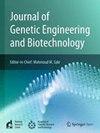TTN突变的性别特异性见解:女性肾透明细胞癌风险的潜在生物标志物
IF 2.8
Q3 Biochemistry, Genetics and Molecular Biology
Journal of Genetic Engineering and Biotechnology
Pub Date : 2025-06-04
DOI:10.1016/j.jgeb.2025.100506
引用次数: 0
摘要
肾透明细胞癌(KIRC)是世界范围内癌症死亡的主要原因,但其早期检测仍然受到缺乏遗传标记的阻碍。我们的研究旨在寻找可作为预后指标的前瞻性生物标志物,并帮助确定有效的KIRC治疗候选药物。重要的是,本研究确定了在KIRC中起关键作用的枢纽基因及其对男性和女性患者的影响。在七项KIRC研究中,基因门户被用于识别频繁突变的基因。此外,使用GSE168845鉴定差异表达基因。分析结果显示,KIRC中titin (TTN)基因发生突变并上调。随后,利用TNMplot鉴定了野生型TTN与突变型TTN的差异基因。使用NetworkAnalyst工具对这些基因进行KEGG分析和PPI分析。此外,Kaplan-Meier绘图仪被用于进行总体生存分析。我们的研究结果表明,TTN基因导致女性的预后比男性差。我们还发现女性特异性催乳素信号通路在KIRC的进展中起着重要作用。此外,我们的研究表明,参与催乳素信号通路的GDF15基因对女性KIRC的预后比男性差。此外,mRNA表达分析显示,GDF15和MAPK14在KIRC中呈负相关。总之,我们的研究表明,TTN、GDF15和MAPK14可以作为女性KIRC患者的预后生物标志物,为这些癌症的强化治疗和患者预后提供了前景。本文章由计算机程序翻译,如有差异,请以英文原文为准。
Gender-specific insights into TTN mutation: potential biomarker for female risk in kidney renal clear cell carcinoma
Kidney Renal Clear Cell Carcinoma (KIRC) is a leading cause of cancer death worldwide, but its early detection remains hindered by a lack of genetic markers. Our study aims to find prospective biomarkers that could serve as prognostic indicators and help in the identification of efficient drug candidates for KIRC treatment. Importantly, this study identifies the hub genes that play a crucial role in KIRC and their impact on male and female patients. The cBioPortal was used to identify frequently mutated genes across seven KIRC studies. Additionally, GSE168845 was employed to identify the differentially expressed genes. The analysis revealed that the titin (TTN) gene was mutated and upregulated in KIRC. Subsequently, differential genes of wild-type TTN versus mutant TTN were identified using TNMplot. The NetworkAnalyst tool was used to conduct KEGG analysis and PPI analysis on these genes. Furthermore, the Kaplan-Meier Plotter was utilized to perform overall survival analysis. Our findings indicated that the TTN gene leads to poorer prognosis in women than in men. We also discovered that the female-specific prolactin signaling pathway plays a significant role in the progression of KIRC. Moreover, our study suggested that the GDF15 gene, involved in the prolactin signaling pathway, has a worse prognosis for KIRC in women than in men. Additionally, mRNA expression analysis showed a negative correlation between GDF15 and MAPK14 in KIRC. Collectively, our research indicates that TTN, GDF15, and MAPK14 can serve as prognostic biomarkers in female KIRC patients, offering prospects for enhanced treatment and patient outcomes in these cancers.
求助全文
通过发布文献求助,成功后即可免费获取论文全文。
去求助
来源期刊

Journal of Genetic Engineering and Biotechnology
Biochemistry, Genetics and Molecular Biology-Biotechnology
CiteScore
5.70
自引率
5.70%
发文量
159
审稿时长
16 weeks
期刊介绍:
Journal of genetic engineering and biotechnology is devoted to rapid publication of full-length research papers that leads to significant contribution in advancing knowledge in genetic engineering and biotechnology and provide novel perspectives in this research area. JGEB includes all major themes related to genetic engineering and recombinant DNA. The area of interest of JGEB includes but not restricted to: •Plant genetics •Animal genetics •Bacterial enzymes •Agricultural Biotechnology, •Biochemistry, •Biophysics, •Bioinformatics, •Environmental Biotechnology, •Industrial Biotechnology, •Microbial biotechnology, •Medical Biotechnology, •Bioenergy, Biosafety, •Biosecurity, •Bioethics, •GMOS, •Genomic, •Proteomic JGEB accepts
 求助内容:
求助内容: 应助结果提醒方式:
应助结果提醒方式:


